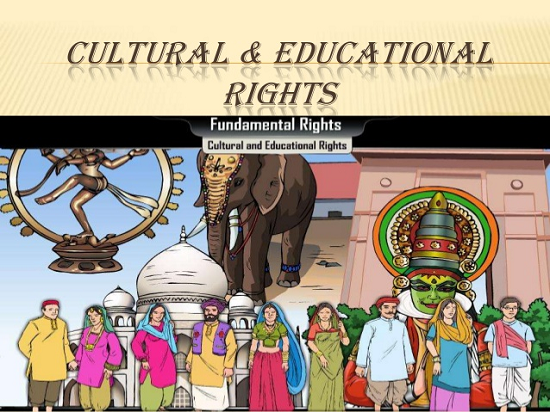
The cultural and educational rights granted to the citizens of India were inculcated in the Constitution with the sole objective of aiming to protect the rights and interests of the individuals belonging to the minority groups. Articles 29 and 30 focus on conserving and safeguarding the culture of people who are diverse either in terms of language, region or religion.
Article 29 provides: Protection of interests of minorities
(1) Any section of the citizens residing in the territory of India or any part thereof having a distinct language, script or culture of its own shall have the right to conserve the same
(2) No citizen shall be denied admission into any educational institution maintained by the State or receiving aid out of State funds on grounds only of religion, race, caste, language or any of them
It is important to note that Article 29 is only applicable to the citizens of India and not to non-citizens. The claimant(s) of this constitutional right must have a different culture or a distinct language.
The phrase ‘right to conserve the same’ in Article 29(1) refers to the right of a section of citizens to make efforts and work for the preservation of their culture. The sections of the citizens claiming this right are permitted to exercise it to ensure the maintenance of their language by setting up educational institutions and by imparting knowledge to the children belonging to their community.
Article 29(2) talks about the prohibition on the denial of admission into the educational setups for the protection of minority culture which are provided for and financed by the State on any ground- religion, race, language or any of them. This article cannot be invoked in cases where admission is being sought into an educational institution getting no financial aid from the State. Article 29(2) will therefore not be attracted in cases where admission is being denied on a ground not aforementioned.
Article 30 provides: Right of minorities to establish and administer educational institutions
(1) All minorities, whether based on religion or language, shall have the right to establish and administer educational institutions of their choice
(1A)In making any law providing for the compulsory acquisition of any property of an educational institution established and administered by a minority, referred to in clause ( 1 ), the State shall ensure that the amount fixed by or determined under such law for the acquisition of such property is such as would not restrict or abrogate the right guaranteed under that clause
(2)The state shall not, in granting aid to educational institutions, discriminate against any educational institution on the ground that it is under the management of a minority, whether based on religion or language
Article 30 talks about providing protection to religious as well as linguistic minorities. Article 30(1) differs from Article 29(1) is the sense that it can only be availed by linguistic and religious minorities whereas Article 29(1) can be claimed by any citizen(s) of India, even the ones belonging to majority. Also, Article 30 is available to both citizens as well as non-citizens.
Article 30(1A) was added to the Constitution by the 44th amendment stating that in case where the State amasses any educational institution belonging to any of the minority group, then it must be ensured by the State that the amount that has been fixed for that particular property would not result in the restriction of the rights of that community.
Article 30(2) makes sure that the State does not discriminate or show prejudice in providing financial aid to the educational setups administered by religious and linguistic minorities. The minority educational institutions can be categorized into three kinds:
- Institutions pursuing for neither financial aid nor recognition from the State
- Institutions wanting recognition from the State but not aid
- Institutions wanting both recognition and financial aid from the State
The State holds a regulatory authority over the educational institutions belonging to category 2 and 3 in terms of employment of teachers, syllabus, discipline etc. whereas the institutions belonging to the first category are free to administer their institutions in the way they seem fit, however, they are subjected to the operation of general laws.
Aishwarya Says:
I have always been against Glorifying Over Work and therefore, in the year 2021, I have decided to launch this campaign “Balancing Life”and talk about this wrong practice, that we have been following since last few years. I will be talking to and interviewing around 1 lakh people in the coming 2021 and publish their interview regarding their opinion on glamourising Over Work.
If you are interested in participating in the same, do let me know.
Do follow me on Facebook, Twitter Youtube and Instagram.
The copyright of this Article belongs exclusively to Ms. Aishwarya Sandeep. Reproduction of the same, without permission will amount to Copyright Infringement. Appropriate Legal Action under the Indian Laws will be taken.
If you would also like to contribute to my website, then do share your articles or poems at adv.aishwaryasandeep@gmail.com
We also have a Facebook Group Restarter Moms for Mothers or Women who would like to rejoin their careers post a career break or women who are enterpreneurs.
We are also running a series Inspirational Women from January 2021 to March 31,2021, featuring around 1000 stories about Indian Women, who changed the world. #choosetochallenge
